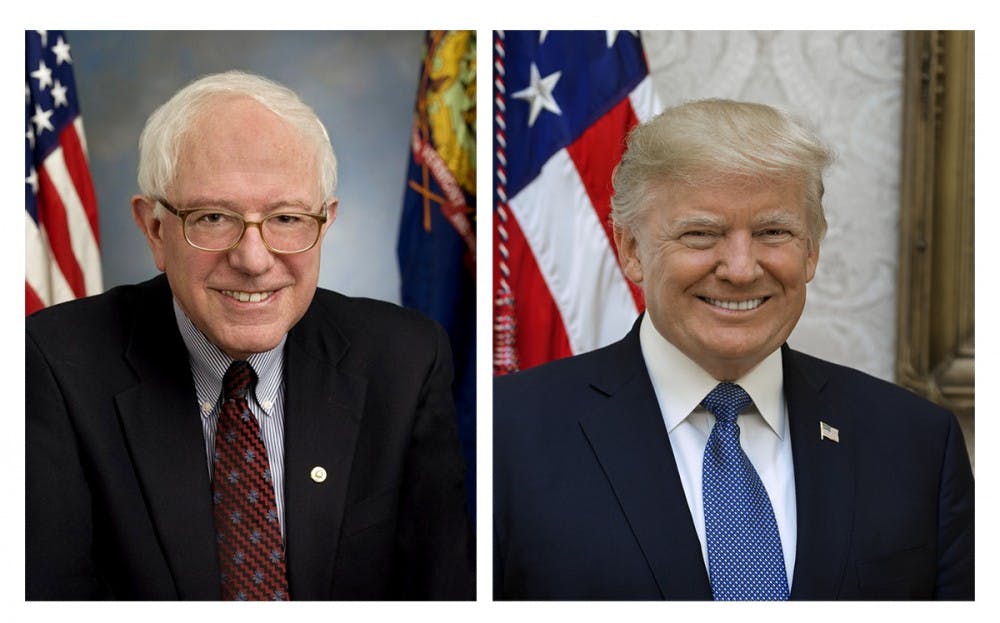Recently the Cavalier Daily published a column titled “Reject Populism” which argued that the brand of politics allegedly espoused by President Donald Trump and Sen. Bernie Sanders (I-Vt.) are damaging to American people and politics. However, it’s wrong to equivocate people like Trump, who by all measures aims to create outward racial tension as a means of maintaining power with left-wing class-struggle messages like Bernie Sanders. Right-wing populists like Trump seek to maintain power through division and fear, while left-wing populism seeks to mobilize the majority of people in response to the economic elites. Additionally, the attempt to discredit social justice fights by linking both Sanders and Trump to populism are shallow efforts to maintain the status quo.
Also troubling is the author’s assertion that the view that the world is unfair to non-elites “is damaging to the country when it is widely accepted.” Beyond the handwaving that allows the polar opposite policies of Trump and Sanders to be glossed over, this line posits that the world is not inherently unfair to non-elites. This errant view obscures the truth — the economic and political system of the world does disadvantage non-elites.
In a country where the top .1 percent of people own as much wealth as the bottom 90 percent, it’s not because the economic system is fair and those with wealth are just so much more talented than others. It’s because the economic and political system of the United States allows uber-wealthy families to influence elections and corporation CEOs to reap immense profits as their workers are faced with wage stagnation.
If you believe that the political and economic system isn’t rigged against poor and working-class, then you should expect open admissions universities like U.Va. to be fairly representative of the population. Clearly, though, this isn’t the case. The median family income at U.Va. is $155,000 while the median household income of Virginia is $68,766, and the median family income of the country is $61,372. It doesn’t require viewing this income breakdown as insidious to recognize that clearly people with a higher income and more wealth have better access to resources and education, such as U.Va., than those with less money.
It is not an outrageous claim to simply say that greater wealth — and the resources that stem from it — gives people more opportunities than others. It then follows, that regardless of whether you agree that this is fair or not, the rhetoric that is used by Sanders isn’t unsubstantiated. Rather, the class conflict explanation provided by Sanders actually gives people a way of conceptualizing the problems they face. For example, private insurers rake in billions of dollars in profit a year, just as millions of Americans have no insurance, and face mounting medical debt. To believe that this massive disparity is fair is akin to saying it’s just natural that some people can’t afford necessities like healthcare. But the message that identifies private insurance’s profit over people motive helps explain this problem. The reason, then, that Sanders is called a populist is in large part because he is willing to question the consensus that leaves millions of Americans without health insurance.
The article also argues that populism causes divisiveness, but this is confusing rhetoric that draws attention to these divisions with the source causing it. Bernie Sanders' populist appeal and political rhetoric didn't create the country's current political polarization, the country's long standing economic inequality did. Sanders’ eagerness to offer both an explanation and solution to socio-economic cleavages is not only providing a far more accurate picture of American capitalism but is doing more work to unite the majority of working-class people together rather than drive them apart.
It is not, as the article would have you believe, a bad thing to call out corporate greed and wealthy elites. Instead, it actually provides a blueprint to affect change in the world. The idea of uniting working-class people around common needs like healthcare is the best opportunity to break across racial and ethnic barriers which are exacerbated by right-wing demagogues like Trump.
Jake Wartel is an Opinion Columnist for The Cavalier Daily. He can be reached at opinion@cavalierdaily.com.







